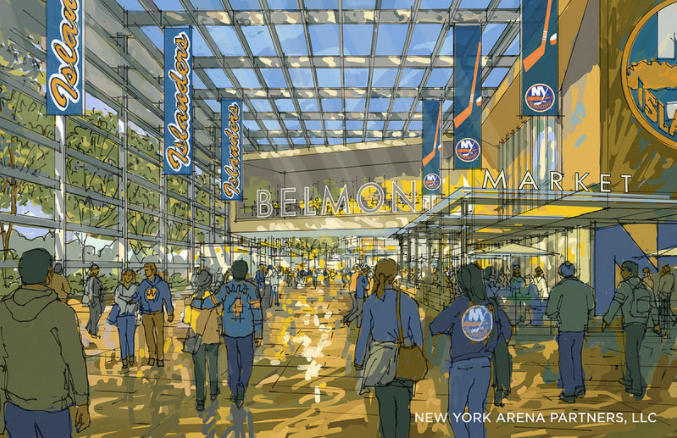Despite traffic congestion concerns, the Belmont Arena draft environmental impact study was approved last week by the Empire State Development Corp. Board of Directors.
One of the most discussed issues regarding the proposed development is transportation in the area.
“Does anyone at ESD with a straight face really believe that the pollution, traffic, dirt caused by 90,000 visitors on Belmont Stakes day is not relevant to whether 20,000 people for 150 nights a year or mega-mall won’t have a local impact?” Tammie Williams, a Belmont Park Community Coalition board member, said.
A number of local intersections will experience significant adverse impacts, said Tom Conoscenti, real estate development and planning vice president for Empire State Development, the state’s economic development agency.
Of the 38 intersections that were studied, 29 are at risk of experiencing adverse impacts at different times in the week, according to the project’s draft environmental impact statement.
The development seeks to erect a 19,000-seat arena home for the New York Islanders, a retail space, a 150-foot-tall hotel that has been shrunk from the initial proposed 250 feet after community concerns, 7,000 parking spaces in three lots and a power substation. Community groups have voiced concerns over the growth of the scope of the development.
The study also found that there are unavoidable adverse impacts on the Cross Island Parkway, a major highway bordering the development, that cannot be mitigated, Conoscenti said.
Highway segments on the parkway were analyzed northbound and southbound between the Southern State Parkway and Jamaica Avenue. Thirty-seven segments were studied, and it was determined that up to 88 different adverse impacts are likely during weekday morning and evening peak hours as well as Saturday mid-day, evening and night, according to the environmental study.
The parkway already operates at congested or near-congested capacity at peak hours and would be the designated route for approximately 85 percent of those visiting the proposed project, the environmental study states. Widening the parkway is neither practical nor feasible, according to the study.
“The Cross Island Parkway is a bit more of a challenge,” Rachel Shatz, vice president of planning and environmental review for the development agency, said. The agency will pursue less conventional measures and strategies to influence traffic in the area, Shatz said.
Empire State Development plans to continue developing a transportation management plan “to influence the behavior of event-goers” involving staggering arrival times, carpooling and public transportation, among others to try and alleviate the strain that would be placed on parkway.
The 205-page board materials document, which outlines the environmental impact statement, was published online last Wednesday night ahead of the vote.
The Long Island Rail Road is expected to provide two trains operating from Jamaica Station before and after each hockey game, Conoscenti said. Empire State Development also expects that the MTA and LIRR will cooperate with the New York Belmont Development Partners to automate track switches for improved service to the Belmont station. The partners will also contribute funding for the automation of the switches and train service.
The development agency will work with the LIRR to explore opportunities for a full-time station with east and westbound access to address the needs of commuters and local residents, particularly those concerned with the 3,000 permanent jobs the development would provide and the expected 45,000 daily visitors, Conoscenti said.
The construction would also create 10,000 temporary jobs, he said.
Belmont Park Community Coalition representative Norman Siegel addressed the board over the lack of a concrete solution to the traffic issue.
“What we’ve requested for over a year has not been addressed,” Siegel said. Another concern Siegel and Williams shared was the lack of information provided by Empire State Development about how the erection of stadiums and retail spaces has affected the surrounding communities.
The agency has failed to study the effects of arena developments in other areas of the country and whether or not they turned out to be economic generators, Williams said.
Williams said she has also been disappointed by Islanders owner Jon Ledecky, who has not been present at community meetings involving the development, according to the coalition.
“Shame on Jon Ledecky,” Williams said.
“The scope of this project has significantly changed since it was first proposed,” Village of Floral Park Deputy Mayor Kevin Fitzgerald said. In a community meeting this fall, Fitzgerald used the term “scope creep,” to describe what was occurring.
Fitzgerald expressed concern over the size of the development and particularly the potential of tailgating in the parking lots in the vicinity of the village’s schools and residential neighborhoods.
Traffic is already a significant problem in the village as a result of LIRR work that has recently begun for the third track expansion.
“To add another significant project would cripple our economics, traffic and the livelihood of our residents,” Fitzgerald said.
Kevin Flood, representing the West End Civic Association in Floral Park, said all of the village’s civic associations felt that the project is “incompatible with the character of Floral Park and share the belief that the proposed development will have a significant detrimental impact.”
Following the vote of approval, Empire State Development will move forward with the project, adopting the Proposed General Project Plan.
The agency scheduled three public hearings as a part of the next phase of the project.
Elmont Memorial Library will host all three public hearings, the first on Tuesday, Jan. 8, 2019 from 6 p.m. to 9 p.m., the second Jan. 9 from 4 p.m. to 6 p.m. and the last Jan. 10 from 6 p.m. to 9 p.m.. Written comments can be submitted until Feb. 11. Copies of the DEIS are available for public review at the library, as well as Floral Park Public Library and Queens libraries in Bellerose, Queens Village and Cambria Heights.



